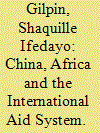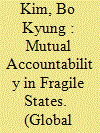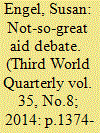|
|
|
Sort Order |
|
|
|
Items / Page
|
|
|
|
|
|
|
| Srl | Item |
| 1 |
ID:
189938


|
|
|
|
|
| Summary/Abstract |
The China–Africa relationship has received increased interest over the past few decades as scholars critically examine the challenge that China, in its quest for a closer strategic partnership with Africa, poses to the norms governing the neoliberal world order (NLWO). One crucial aspect of this is international aid, and how Chinese aid to Africa differs from Western aid. This paper argues that Chinese aid reduces the power of traditional aid donors to shape the development route of African countries. This new development finance ultimately breaks the monopoly of Western aid to decide how poor countries in the global ‘South’ develop. In doing so, the Sino–African aid relationship is challenging the current world order as it offers African states the possibility to decouple (or delink) themselves from the global economy. By challenging assumed neoliberal economic development fundamentals, this relationship, if harnessed correctly by African leaders, can pose longer-term ideological questions around the very set of ideas that underpin development itself, while enabling African states the policy space needed to pursue more sustainable development from an Afro-centric perspective. It is this possibility to delink, due to changing ideological fundamentals concerning economic development, that is the challenge China and Africa pose to the NLWO.
|
|
|
|
|
|
|
|
|
|
|
|
|
|
|
|
| 2 |
ID:
111072


|
|
|
|
|
| Publication |
2012.
|
| Summary/Abstract |
There is a consensus in the international community that rural electrification and, in particular, the productive use of electricity contributes to poverty alleviation. At the same time, efforts to evaluate the impacts of development projects have increased substantially. This paper provides a hands-on guide for designing evaluation studies regarding the impacts of productive electricity usage. Complementary to the existing literature on evaluation methods, this guide familiarizes project managers with the concrete steps that have to be undertaken to plan and implement an evaluation. The guide comprises three modules based on enterprise surveys and on anecdotal case studies. For each module, the implementation is described on a step-by-step basis including conceptual issues as well as logistics and methodological questions.
|
|
|
|
|
|
|
|
|
|
|
|
|
|
|
|
| 3 |
ID:
190215


|
|
|
|
|
| Summary/Abstract |
The study reported in this article aimed to find the extent to which the mutual accountability mechanism is applicable in fragile states where state capacity and legitimacy are insufficient. Donors provide foreign aid to fragile states even when there is no firm-standing counterpart to be held accountable. This is done to meet short-term development needs that are heavily focused on humanitarian relief. Based on an examination of the discursive evolution of fragility and donors’ categorization of fragile states based on the capacity-legitimacy configuration, this found that development needs in fragile states can be met through mutual accountability relations with partnership platforms. Represented by the g7+, partnership platforms channel the development needs in a collective form and enable their Member States to gain a certain level of legitimacy. Individual approaches to these countries may be challenging, but seeking strategic responses to development needs through such partnership platforms can create new opportunities for development effectiveness.
|
|
|
|
|
|
|
|
|
|
|
|
|
|
|
|
| 4 |
ID:
134394


|
|
|
|
|
| Summary/Abstract |
The ‘Great Foreign Aid Debate’ raged in the 2000s yet there are few overviews of it. This paper builds on heuristic classifications of the debate not to simply classify it, but rather to explore how it is perhaps not as ‘great’ as claimed and, in fact, is contributing to a narrowing of thinking about development possibilities. The paper explores the debate through the books released in the 10 years from 2001 that made both an academic and a media impact. It analyses what gets discussed and why and, equally importantly, what does not get discussed. In terms of what is missing, the paper posits that ‘left’ has disappeared and the progressive critique and support for aid has been left to scholars like Jeffrey Sachs and Jonathan Glennie.
|
|
|
|
|
|
|
|
|
|
|
|
|
|
|
|
| 5 |
ID:
167068


|
|
|
|
|
| Summary/Abstract |
The acknowledgement of politics and institutions in developing countries is well in line with debates not only in the area of development effectiveness but also regarding new public management. Results-Based Approaches (RBApps), conceptually framed within these two debates, are designed to support outcome- and impact-oriented development goals. They link the achievement of results to monetary and/or non-monetary reward mechanisms. However, so far, development cooperation partners have mainly applied RBApps in the form of Results-Based Finance and Results-Based Aid. Through the provision of a conceptual framework, this paper embeds RBApps between different tiers of government within the discussion and applies Rwanda as a case study to it. Along the lines of Rwanda’s Domestic Performance Approach Imihigo, the article argues that development co-operation should be more proactive in considering these approaches, as they might be crucial in terms of sustainability and serve as a promising entry point for programmes supported by development partners.
|
|
|
|
|
|
|
|
|
|
|
|
|
|
|
|
|
|
|
|
|